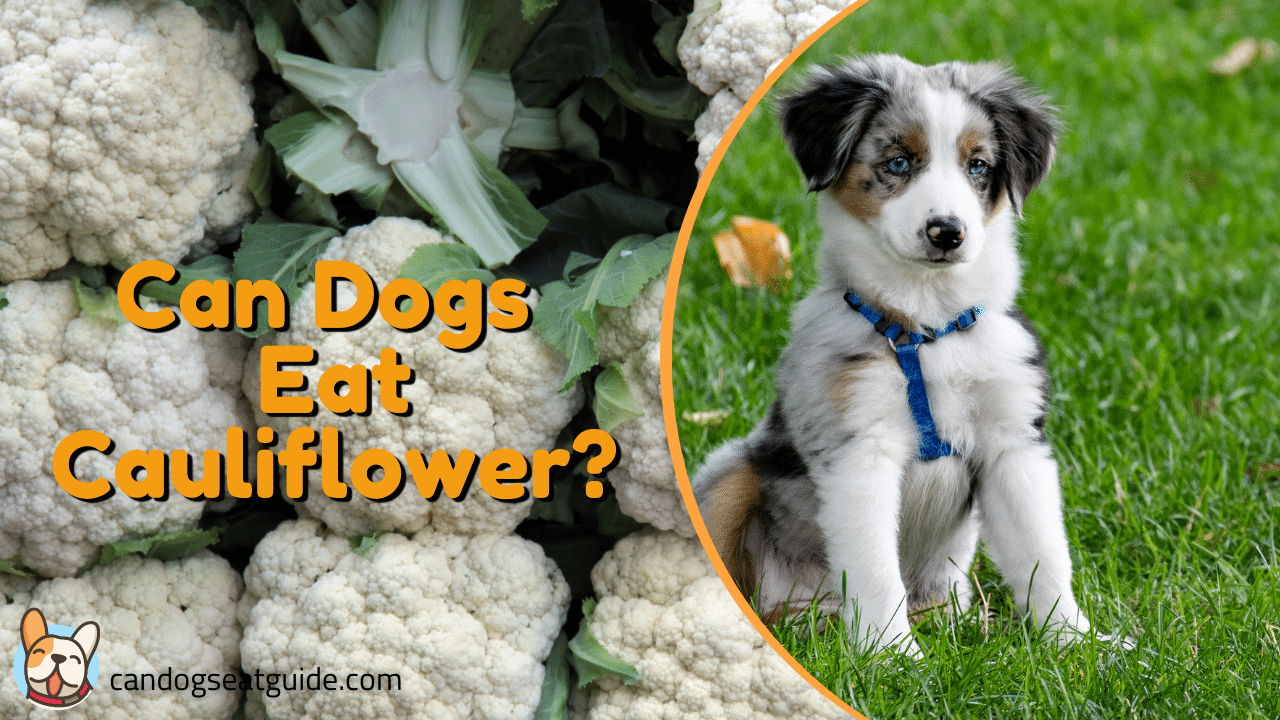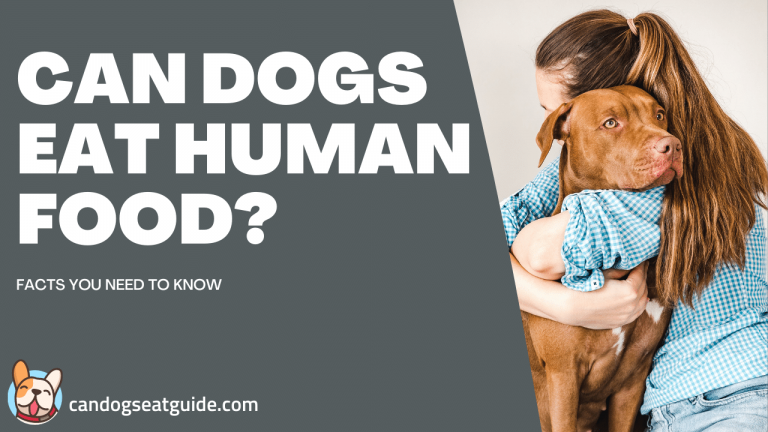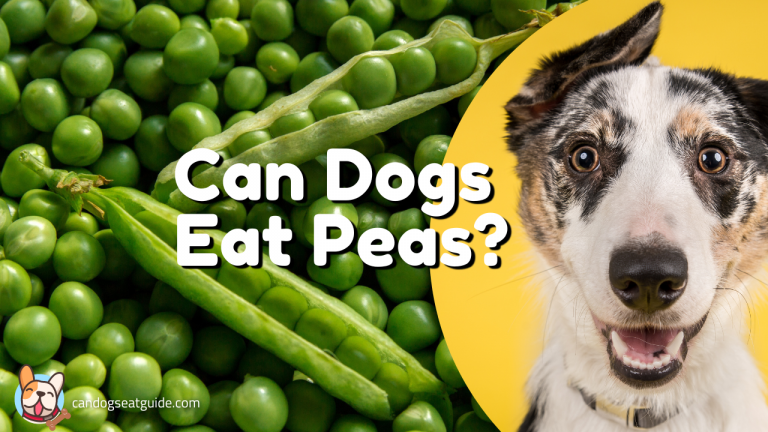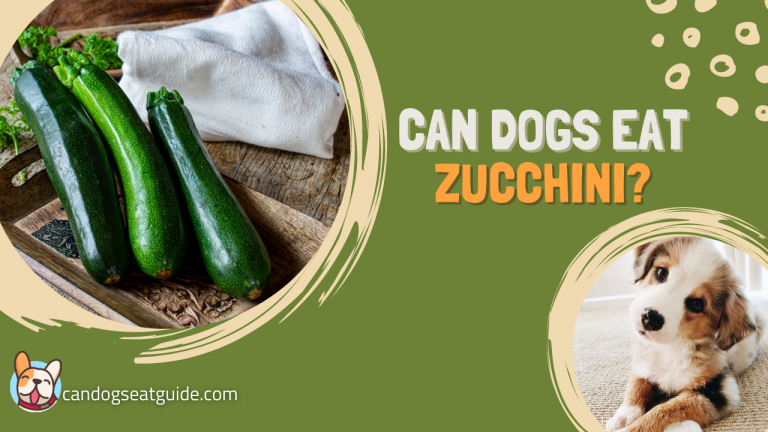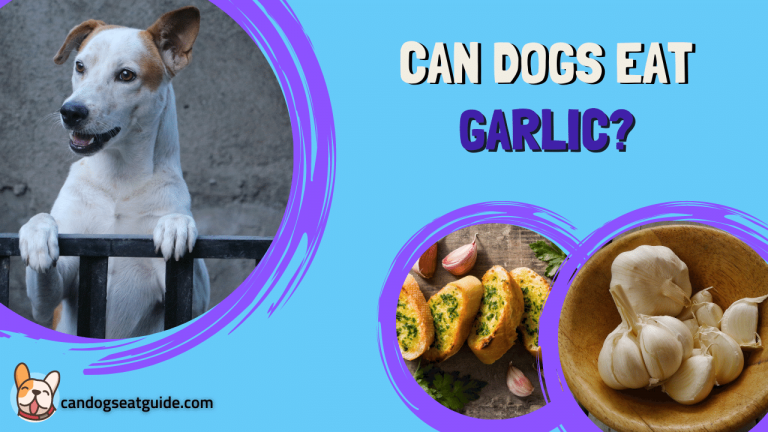Vegetables are an essential part of a varied food for people. But the same goes for dogs.
Let’s be honest, there are many people that don’t like cauliflower. It’s okay. But cauliflower is a veggie that is so rich in vitamins, minerals, and antioxidants.
It has almost the same amount of Vitamin C as oranges.
When you know how nutritious it is, don’t you think to give cauliflower a second chance?
Then comes the next question:
Okay, if it is so healthy and rich in nutrients, then can dogs eat cauliflower?
Answer is:
Yes, dogs can eat cauliflower.
You can get to know how and when if you keep reading.
What is cauliflower?
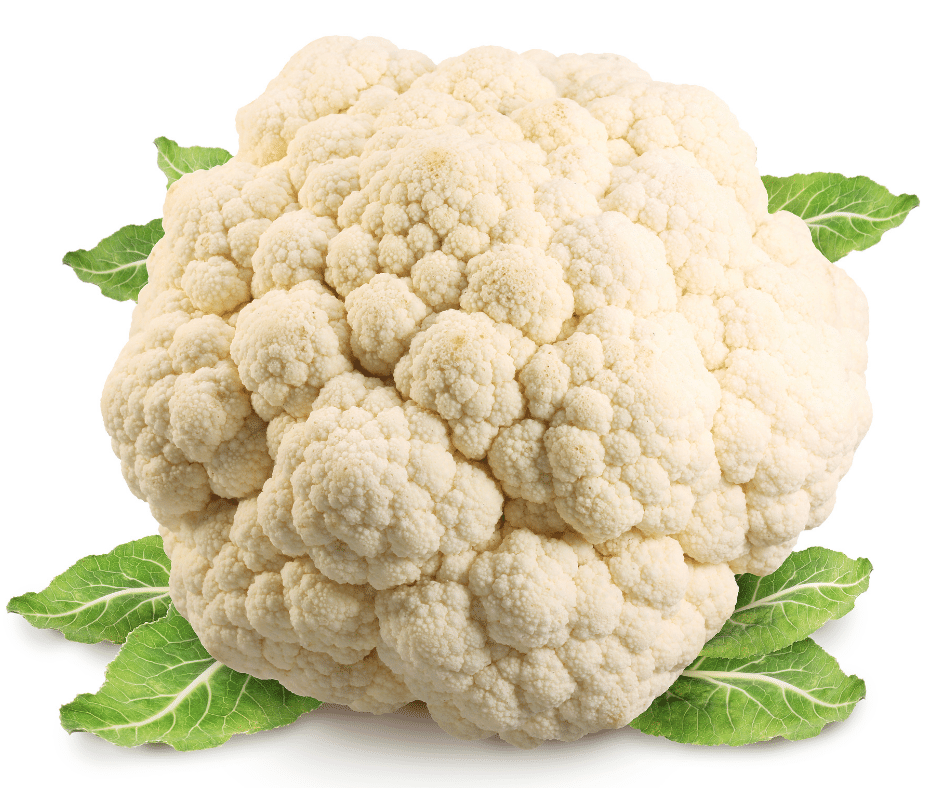
There are many people that know cauliflower as another kind of cabbage.
Cauliflower is a cruciferous vegetable, that looks like a white version of broccoli. It is an annual plant that reproduces by seed.
Cauliflower, broccoli, Brussels sprouts, cabbage, and kale all are members of Brassica oleracea.
Can Dogs Eat Cauliflower?
If you love to eat cauliflower then I have good news for you. Cauliflower is safe for your dog too. But as with everything else, it should be given in moderation. Cauliflower is a great low-calorie treat.
A great source of fiber, vitamins K and C, and minerals. It is rich in minerals such as calcium, potassium, and folate. All of them help for the healthy condition of the liver, immune system, and vision of your dog.
Can Dogs Eat Cauliflower: Nutritious Information
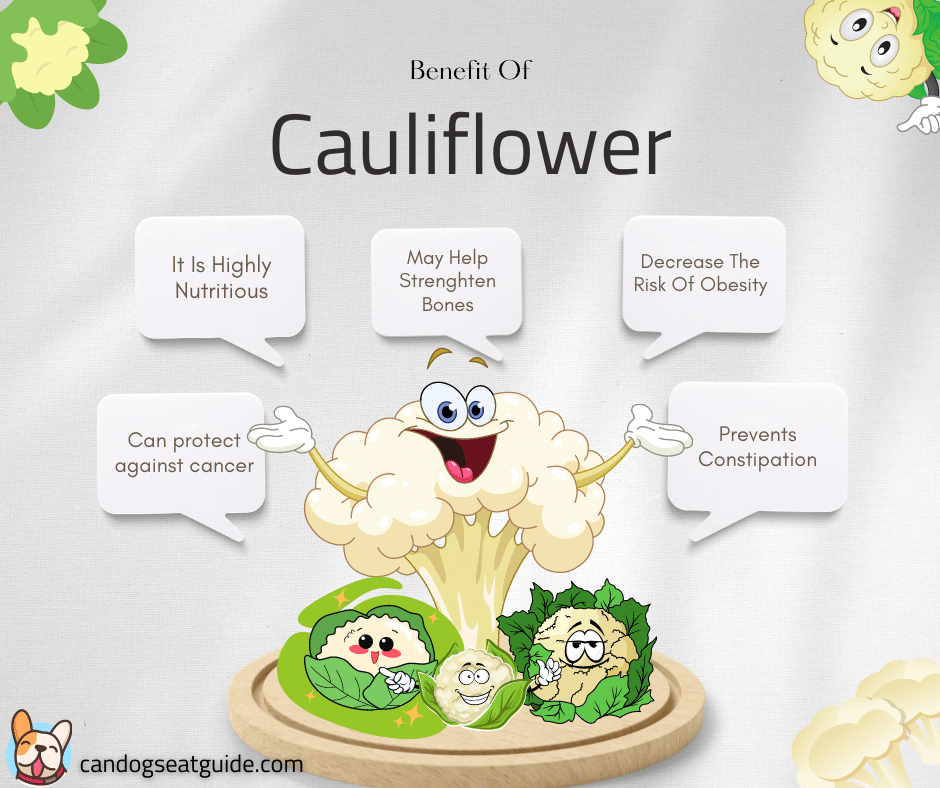
According to the United States Department of Agriculture (USDA), one cup of chopped raw cauliflower weighing around 107 grams, contains:
| Name | Amount |
| Energy | 27 calories |
| Protein | 2 grams |
| Fat | 0.3 grams |
| Carbohydrate | 5 grams |
| Calcium | 24 milligrams |
| Magnesium | 16 milligrams |
| Phosphorus | 47 milligrams |
| Potassium | 320 milligrams |
| Vitamin C | 51.6 milligrams |
| Vitamin K | 16.6 micrograms |
Cauliflower is an excellent source of vitamin C, vitamin K, folate, pantothenic acid, and vitamin B6.
It is a very good source of choline, dietary fiber, omega-3 fatty acids, manganese, phosphorus, and biotin.
Health Benefits For Dogs
Cauliflower is a good choice even for dogs with the sensitive digestive system and food allergies. Fiber is good for the gut health of your dog.
If your dog has a problem with losing weight, then cauliflower is a great choice for a low-calorie snack. It slows down the digestive system. The insoluble fiber in cauliflower helps with constipation and diarrhea.
Vitamin K reduces the risk of heart disease by regulating the levels of calcium in the blood. It improves bone metabolism and helps the proper blood clotting.
Cauliflower is very rich in antioxidants that fight against the free radicals in the dog’s body. Vitamins C and A, beta-carotene, and folate are needed for good eyesight and can improve night vision. They provide anti-inflammatory properties.
The minerals in cauliflower such as calcium, potassium, and magnesium support the skeletal structure, cell, and muscle function of dogs.
How Should I Feed Cauliflower To My Dog?
You can give your dog frozen, raw, or cooked cauliflower – in every form it is nutritious and safe. You should cut the cauliflower into small bites so you can prevent the risk of choking and gastrointestinal discomfort.
See what will work best for your dog but remember to feed cauliflower in small amounts. Big amounts can lead to diarrhea or some other health problem. A small dog might just need one or two pieces of cauliflower per day. Bigger dogs may eat 4-5 pieces of cauliflower per day.
Raw and frozen cauliflower contain the most nutrients, but they may be a problem for the digestive system of your dog.
Cooked cauliflower loses some of its nutrients but makes it easier for the gut of our dogs. It also can reduce bloating and gas.
How can I cook cauliflower?
You can boil, steam, roast, mash, or rice that veggie. Cooking reduces the risk of choking.
You can mash it with potatoes, sweet potatoes, or green beans.
Can Dogs Eat Cauliflower: Dog-Friendly Recipes
1. Dog-Friendly Pizza With Cauliflower
Serving: 12-inches round pizza

Ingredients:
For crust:
- 1 whole cauliflower;
- 1/2 cup of shredded mozzarella cheese;
- 3 tablespoons of shredded parmesan cheese;
- 2 large eggs.
Pizza toppings:
Important note: Be sure that tomato paste doesn’t contain xylitol.
Instructions:
- Preheat the oven to 425 degrees Fahrenheit.
- Line a baking tray with parchment paper.
- Spray a thin layer of non-sticking spray on the paper.
- Use a food processor to finely grind the cauliflower. We need 3 cups of cauliflower.
- Transfer 3 cups of it into a microwave-safe bowl. Cover the bowl with a wet paper towel or with saran wrap (remember to leave some airway if using saran wrap to allow hot air to escape).
- Microwave on high for 5 minutes or until cauliflower is soft.
- Remove the excess water from the cauliflower using a cheesecloth, clean towel, or tea bag.
- Transfer the drained cauliflower to a large bowl. Add the shredded mozzarella cheese, shredded parmesan cheese, and eggs. Mix well.
- Spread the cauliflower pizza dough onto the baking tray you prepped earlier. Bake for 13 mins or until golden.
- Cook the ground turkey in a medium hot pan until fully cooked. Do not add any seasoning.
- In a small bowl, mix tomato paste with water. This will be the pizza sauce for your dog-safe pizza.
- Once the cauliflower pizza dough is finished baking, you can add all your pizza toppings (pizza sauce, cheeses, cooked ground turkey).
- Put the pizza into the oven and bake for 3-5 mins to allow the cheese to melt. Top the cooked pizza with basil.
- Allow pizza to cool down before serving it to your dog.
2. Turmeric Roasted Cauliflower

Ingredients:
- 1 small head of cauliflower, cut into florets;
- 1 tablespoon of avocado oil;
- 1 teaspoon of ground turmeric;
- 1/2 teaspoon of ground cinnamon;
- pinch of salt.
Steps:
- Preheat the oven to 400 degrees Fahrenheit.
- Place cauliflower florets onto a baking sheet.
- Toss with avocado oil, turmeric, cinnamon, and salt.
- Roast for 20-25 minutes until it gets soft and gold-brown around the edges, tossing once halfway through.
- Let it cool and serve.
3. Cheesy Cauliflower Muffin Bites
Source: Pawsitively Pets
Ingredients:
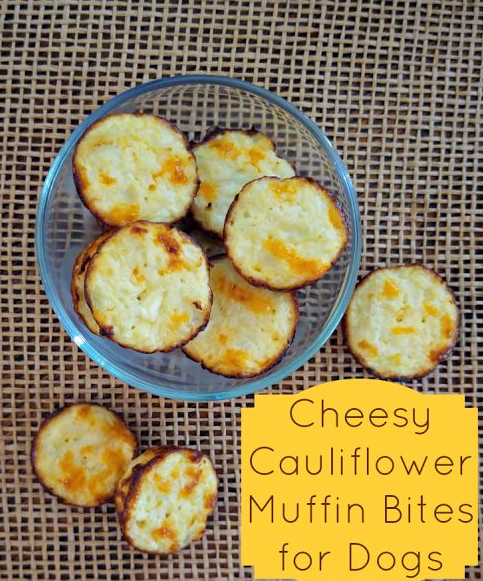
- 1 head of cauliflower;
- 1/2 cup of cottage cheese;
- 2 eggs;
- 1/4 cup water;
- 1/4 cup cheddar cheese (optional);
- 1 tablespoon vegetable oil.
Directions:
- Preheat your oven to 400 degrees Fahrenheit.
- Chop your cauliflower into small pieces.
- Add about a 1/4 cup water and all of the chopped cauliflower to a microwave-safe bowl, cover, and microwave for 3-5 minutes.
- Remove the cauliflower, stir, recover, and microwave for another 3-5 minutes.
- Drain the water from the cauliflower and add it to your food processor or blender. Pulse until mostly all of the large chunks of cauliflower are gone.
- Add the cauliflower, cottage cheese, eggs, and cheddar cheese to a mixing bowl and stir together until everything is mixed well.
- Use vegetable oil to grease your muffin pan lightly so the treats don’t stick to the pan.
- Add the cauliflower mixture to the muffin pan. You can fill them to the top. Press down gently on each one.
- Bake in your preheated oven for 25 minutes or until golden on top and firm to the touch. Remove from pan and let them cool.
9 Fun Facts About Cauliflower
- Cauliflower is related to kale, broccoli, and brussels sprouts.
- It peaks in the autumn and spring.
- Cauliflower is packed with Vitamin C. One cup contains about 75% of your recommended Vitamin C daily intake.
- The most popular is the white cauliflower but there are also yellow, orange, green, and purple. Orange cauliflower is slightly sweeter and has more beta-carotene than white, while purple cauliflower, also slightly sweeter and nuttier, is high in anthocyanin, a healthy antioxidant commonly found in purple vegetables.
- Cauliflower is reactive with some metals. Be extra careful when choosing cookware for cooking cauliflower. The vegetable contains sulfur compounds, which will react with aluminum and iron resulting in a discolored cauliflower.
- Originally comes from Cyprus.
- It is a popular vegetable in Poland where it is eaten in a soup with cream or fried with bread crumbs.
- Cauliflower can be used as a rice replacement. Riced cauliflower has a similar consistency to actual rice, it’s cheap and easy to make.
- Steaming cauliflower preserves the most nutrients.
FAQs
Can dogs eat cauliflower stems?
Cauliflower stems are safe for dogs when they are chopped small and cooked.
Can dogs eat cauliflower and broccoli?
Yes, both vegetables are good for dogs. You can mix them and steam or boil them but without seasonings or oils.
Can dogs eat cauliflower leaves?
It is safe for dogs to eat cauliflower leaves but in moderation. They are a good source of fiber and vitamin C. They can be a great addition to your dog’s food.
Can dogs eat cauliflower rice?
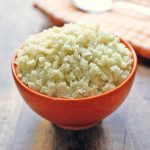
Cauliflower rice is good for dogs. It is grated or processed cauliflower, but if you don’t have time to do it by yourself then be sure that store-bought one is without any seasoning like garlic or onion.
Can cauliflower upset a dog’s stomach?
Yes, it can but only if cauliflower is not given in the proper amount. It can cause diarrhea and excessive gas.
Can dogs eat cauliflower daily?
Dogs shouldn’t eat cauliflower on daily bases but you can include it at least once a week as part of their diet.
Conclusion
The diet of your dog should be balanced between fruits, vegetables, and meat. Cauliflower is safe for dogs in moderation and can be given in any form – frozen, raw, or cooked. It can be a great nutritious treat but low in calories. Cauliflower is also a great natural remedy for constipation.
Leave us a comment if you are planning to include cauliflower in your dog diet and let us know if you have any tasty recipes with this veggie, too.

